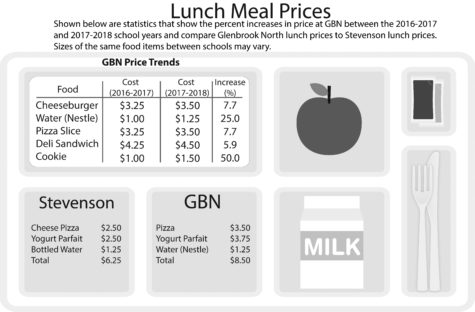Raised meal prices spark concern

Graphic by Ryan Matus
At the beginning of each lunch, the cafeteria bustles with students holding sandwiches, pizza slices and fries. When senior Lauren Holick paid for her food at the start of the school year, she noticed certain items in the cafeteria had increased by as much as 50 percent, most notably the cookies.
According to Nicholas Saccaro, president of Quest Food Management Services, price increases have impacted several popular meal items at Glenbrook North. Several reasons led to these price increases, such as higher labor costs due to minimum wage increases. The food inflation rate is also 2.1 to 3 percent per year. Since the prices of food supplies increase by this rate each year, Quest must compensate by raising prices every couple of years.
“The challenge for us is, we can’t just go out and increase prices by three [or] four pennies on every item because of those kids [paying] with cash.
“Sometimes we’ll hold [prices] for two, three or four years and then make an adjustment of a dime or a quarter because the ability to manage that stuff with cash is a lot easier,” Saccaro said.
Prices increased by 50 cents for cookies, 50 cents for Naked Juice and 25 cents for deli sandwiches, according to Saccaro. Prices also remained the same for many foods in the cafeteria, such as hamburgers, pasta, soups and most breakfast foods.
Senior Emma Cintado said she believes the change in price for the cookies from $1 to $1.50 was one of the more noticeable increases.
“Last year I used to buy [the cookies] all the time, but now I’m frustrated that they’re $1.50, so I won’t buy them as much,” Cintado said.
Saccaro said the reason for the cookies’ price increase stems from one of Quest’s new food philosophies, which is avoiding the use of trans fats in cooking oils. Trans fats were eliminated from the cafeteria cookies soon after the start of the school year. The margarine used in the cookies, which contains trans fats, was replaced with butter, which increased the price by 50 cents because butter is more expensive than margarine.
In addition to the cookies, sweetened beverages, such as Gatorade and Naked Juice, increased in price due to the new Cook County soda tax, according to Saccaro. With the tax, consumers pay an additional cent per ounce, which has been included in the prices for beverages. All taxes are included in the labeled prices for all foods.
Holick said she brings a lunch to school but still buys a snack and a drink from the cafeteria daily. Although she tries to purchase only $2 to $4 worth of goods every day, she feels her “money goes away a lot faster than it should” on her meal balance account.
“Usually I hand the cashier my ID, and they don’t really tell me what the [price] is, and I just pay it,” Holick said.
Cintado said she also felt that her money drained quickly from her account. Her mom noticed this when checking Cintado’s meal balance and was frustrated with her daughter for spending $7 on lunch at the cafeteria.
“I’ll tell her, ‘I don’t feel like I can get a decent, healthy meal there without spending a lot of money,’” Cintado said.
Saccaro said Quest does not have authority to increase prices on its own. The company presents suggested prices to the school district, and the administration either rejects, approves or compromises on pricing.
Quest also manages certain snack vending machines in GBN, but the ones that are owned by Quest did not undergo any price increases from last year to this year, said Saccaro. The company Mark Vend oversees other snack vending machines, and most items in those machines underwent a price increase.
Sophomore Zander Johnson said he did not have an issue with the prices in the cafeteria. Since he is a three-season athlete and needs carbohydrates to perform well, as long as the cafeteria continues to offer sufficient quantities of food, he believes the prices are reasonable.
Holick said despite her feelings about the price increases, she will continue to purchase lower-priced goods, such as candy and chips, from the cafeteria.
“I feel like there still is that necessity to buy something [from the cafeteria] because there isn’t really any other option for me, but it’s still frustrating,” Holick said.

